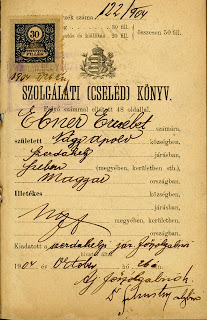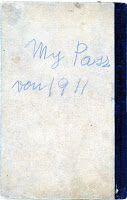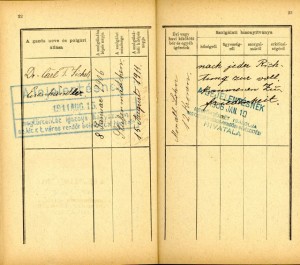Traveling sure was different 100 years ago. My grandmother, Lisi Ebner had to get all her papers in order to travel to America. I found her “passport” among the artifacts she left behind. She had actually written on it “My Pass von [from] 1911.”
I can’t read most of the lines in the “pass” because all is in Hungarian (In 1911, Siebenbürgen/Transylvania was part of the Austro-Hungarian Empire), but things like her town (Nagy-Apold—Hungarian for Grosspold) and dates can be made out.
 Her name seemed to be misspelled—as Erzsébet, instead of Elisabetha. That wouldn’t fly today (literally!). But I was told by my “Rosetta Stone,” Meta, who deciphers the old German letters for me that Erzsébet was the Hungarian name for Elisabetha. (And thanks to Nick at Nick Gombash’s Genealogy Blog, for providing the correct spelling. See his comment below that translates the details of Lisi’s town, district, county, and country—from the Hungarian)
Her name seemed to be misspelled—as Erzsébet, instead of Elisabetha. That wouldn’t fly today (literally!). But I was told by my “Rosetta Stone,” Meta, who deciphers the old German letters for me that Erzsébet was the Hungarian name for Elisabetha. (And thanks to Nick at Nick Gombash’s Genealogy Blog, for providing the correct spelling. See his comment below that translates the details of Lisi’s town, district, county, and country—from the Hungarian)
I always assumed (because of her note) it was a true blue passport, but I’ve learned it was actually a “Dienstbuch,” literally a “service book.” We can consider it a kind of “resume.” In it are listed her various employers, when she started working for them, her job, and even salary. Because of its official nature, (the first page is stamped by the local police!), it appears to have also been used as her passport, per her own note.
This method of keeping track of employers seemed to be pretty common (See my post of May 4th, Happy 125th Birthday). My maternal grandmother, had the same type of book, but in Austria it was called: Arbeitsbuch, literally her “Work-book”).
The first entry listed In Elisabetha Ebner’s “Work-book” is from January 1, 1903-December 31, 1904, when Lisi was ages 15-17.
The next two pages have been filled out by Dr. Carl F[riedrich] Jickeli, (left) Eisenhändler (hardware store owner). I recently learned this was far more than a hardware story, however. It was a kind of department store in the center of Hermannstadt (Sibiu) where you could buy everything from kitchenware to tools and nails to clothing. Lisi actually worked for Carl Jickeli’s wife, Berta, from January 8, 1906, to August 15, 1911, (ages 18-24) as a Stubenmädchen (parlor-maid—a good position). Monthly salary: 12 Kronen. She must have also been given room and board, as she was eighteen miles from her home in Grosspold, but it still doesn’t sound like much. The left page is stamped with the final date of her employment: 1911, Aug. 15. On the right page is hand-written: [Wishing you] complete satisfaction in every path.
For more than five years Lisi was Mrs. Jickeli’s right-hand gal. Her role evolved far beyond that of just a maid, as future letters, revealed. Mrs. Jickeli entrusted her with the running of the household when she had to be away on business, and most importantly, entrusted her young daughter, Lisbeth, to Lisi’s care.
As she prepared to leave the woman she considered a second mother, Lisi would turn to Mrs. Jickeli for a very important document to help her find work in the far-away land of America. Coming up—”The Recommendation.”
I’m curious as to what sort of passports any of my readers may have from their ancestors. Do they seem to be uniquely a passport—or did you find an “employment book” as well—that might have been used as a passport?


What an amazing document to be in possession of, wish I had anything that measured up. I’m afraid my family did not find value in keeping such documents. Which is truly a shame. However I’m living vicariously through your treasures.
I continue to be amazed at the wonderful documents and photos you have. Also, a little jealous if I am honest, but thankful to generous relatives for what I have. Have you met new cousins because of your blog/family story?
I love the way you expand the information by explaining various things, such as the hardware store and the spelling variations. For those of us whose ancestors left few documents, your work helps us more fully imagine their pre-American lives.
Ooh, I’m so thrilled to hear from all of you. I guess I just come from a family of savers. Nothing seemed too unimportant to keep. I saw a business card for a restaurant that I somewhat dismissed — maybe they ate there. But there was that indecipherable writing on the back — so off it went to my Rosetta Stone, Meta. Well, the reason it was kept was then clear. That little tidbit will be coming up as Lisi trip to America gets ever-closer. I’m so glad you’re enjoying these little treasures and the explanations.
OK, I join the ranks of document envy. Amazing, so interesting, thanks for the great post and sharing. Gasping, on the way to the mecca library, hoping for such a fab find. WOW!
Carol and all,
sometimes I’m overwhelmed. Figuring out how to keep track of it all. I’ve ordered a bunch of organizational tools from Hollinger. Hope it will help. it’s that so much is on little scraps as well. An then there’s the indecipherable part. Thank God for Meta. More on my visit to her in Stuttgart — coming up!
The information under her name (Ebner Erzsébet) is her birthplace information:
Nagy Apold town
Szerdahely district
Szeben county
Hungary country
You can find the town here on this 1877 gazetteer: http://www.radixhub.com/radixhub/gazetteers/1877/szeben.htm#093420
I was going to suggest you share your document with Nick Gombash to translate, only to discover he already made his way here. What a precious artifact!
The historical detail you are able to find in your grandmother’s passport is a window into her youth.
Thanks, Nick for the translation of those details under my grandmother’s name — and the proper Hungarian spelling of Elisabetha. The difficult handwriting cropped up as a problem on the ship manifest as well — coming up. And thanks to Kathy for your comment– and thinking of Nick!
Beautiful documents, Linda ~ I have several of my Oma and Opa’s documents also . . . all in old German style handwriting, I love to hold them and look at them. They truly are a treasure for us to have. Thank you for stopping by my blog and leaving a comment . . . Ron and Kieth’s deaths were so very senseless . . . very sad. Love reading your blog, Linda.
BTW – I have my grandfather’s “workbook” from Augsburg, Germany, in my possession – you have inspired me to perhaps blog about it! Thank you, Linda. I too have been very blessed to have some rare and wonderful documents as these.
I hope you do publish your grandfather’s “workbook.” Lots of interesting info in there. I lived in Munich as a student many moons ago — and one of my best friends in my dorm was from Augsburg. I visited him there with my family in 1995. It’s a gorgeous medieval city- also university town – so very fun to visit. I just met up with him (and his fiancee) again last month — in Stuttgart. A 40 year friendship!
Wow! Great document and so interesting that is served as a passport.